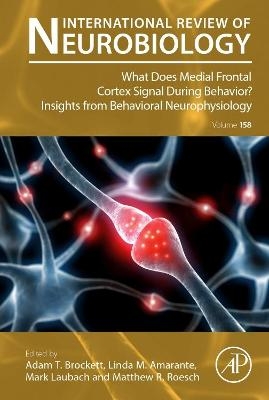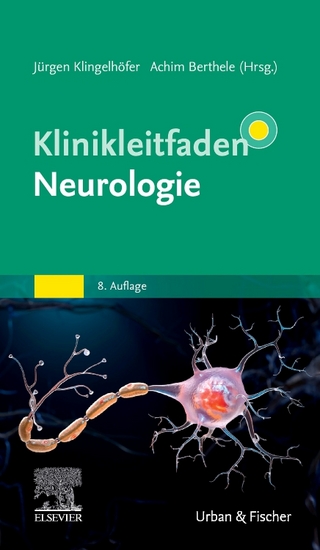
What does Medial Frontal Cortex Signal During Behavior? Insights from Behavioral Neurophysiology
Academic Press Inc (Verlag)
978-0-323-85336-1 (ISBN)
Additional chapters cover The anterior cingulate cortex and event-based modulation of autonomic states, Integration of value and action in medial prefrontal neural systems, Secondary motor cortex: broadcasting and biasing animal’s decisions through long-range circuits, The prefrontal cortex in social cognition, Representing task strategies in the medial prefrontal cortex, Prefrontal contributions to action control in rodents, From affective to cognitive processings: functional organization of the medial frontal cortex, and much more.
Adam Thomas Brockett – Dr. Adam Brockett is a post-doctoral fellow at the University of Maryland, College Park working in the laboratory of Professor Matthew Roesch, exploring the neural correlates of cognitive control across the lifespan. Adam attended the University of Maryland, College Park earning a Bachelor of Science degree in Psychology, and a minor in Neuroscience in 2011. Throughout his undergraduate career, Adam worked as a Student Intramural Research Training Awardee (IRTA) at the NIH in the laboratory of Dr. James Winslow investigating the effects of fluoxetine and differential rearing on social behaviors in rhesus macaques. Following graduation, Adam was a post-baccalaureate fellow (IRTA) at the NIH and worked to develop molecular techniques for the generation of transgenic marmosets under the guidance of Dr. James Pickel. Adam received his PhD from Princeton University working with Professor Elizabeth Gould in 2017. His work with Professor Gould characterized the role of astrocytes in medial prefrontal cortex function and their contributions to cognitive control. Adam received a F32 Ruth L. Kirschstein National Research Service Award (NRSA) in the spring of 2019. Linda M. Amarante – Dr. Linda M. Amarante recently received her PhD in neuroscience from American University in Spring 2020. At American University, she performed research in Dr. Mark Laubach’s laboratory studying the medial frontal cortex and its role in reward-based behaviors and value-based decision making in rats. Her dissertation work investigated the role of the medial and orbital frontal cortices in signaling reward information, which was supported by a Graduate Research Fellowship (GRFP) from the National Science Foundation in 2016. Linda received undergraduate degrees in Psychology and English from Long Island University in 2013, where she performed research on opioids and prenatal mouse development under the guidance of Dr. Grace Rossi. Linda also currently curates projects and runs social media for the Open Behavior project, which is a repository of open-source tools for behavioral neuroscience. She will begin a post-doctoral fellowship with Dr. Jeremiah Cohen at the Johns Hopkins University School of Medicine. Mark Laubach – Dr. Laubach is a professor of neuroscience at American University. His lab studies the role of the medial frontal cortex in goal-directed behavior. Core methods include multi-electrode recordings, optogenetics, multivariate statistics, and computational models of neural circuits. The lab is currently supported by the NIH to study the role of opioid receptors in the prefrontal cortex in reward-guided decisions. In addition, Dr. Laubach and his lab collaborate with Dr. Alexxai Kravitz from Washington University to run the OpenBehavior project, which promotes open-source tools used in behavioral neuroscience research. Dr. Laubach is Director of American University’s PhD program in neuroscience and serves on the editorial boards of eNeuro, The Journal of Neuroscience, and Behavioral Neuroscience. Matthew R. Roesch – Dr. Roesch’s research investigates the neural mechanisms underlying executive control, and their disturbance in drug abuse. Specifically, Dr. Roesch’s lab records single unit activity from multiple brain regions as rats perform a variety of behavioral tasks (e.g. reversal, delay discounting, stop-signal, set-shifting, conflict, social distress, etc) and evaluate loss of function after pharmacological and optogenetic manipulation. Dr. Roesch has over 20 years of experience performing, analyzing, and publishing on this type of research. He completed his dissertation work in the lab of Dr. Carl Olson in the Department of Neuroscience (CNUP) and the Center for the Neural Basis of Cognition (CNBC) at the University of Pittsburgh. There, he recorded from single neurons in several areas in primate frontal and medial cortex during performance of reward and conflict based saccade tasks. After graduating, he accepted a position as post-doctoral fellow on the Cellular and Integrative Neuroscience Post-Doctoral Training Grant at the University of Maryland Medical School under the advisement of Dr. Geoff Schoenbaum. There he continued his work on issues pertaining to value-guided decision-making and reversal learning. Dr. Roesch is currently full professor at the University of Maryland College Park as part of the Department of Psychology and the Program in Neuroscience and Cognitive Science. He is Cognitive and Neural Systems Area Head for Psychology, and Associate Director and Admissions Director for the Neuroscience and Cognitive Science Program.
1. From affective to cognitive processing: Functional organization of the medial frontal cortex
Joseph Simon IV, Peter H. Rudebeck and Erin L. Rich
2. Medial prefrontal cortex encoding of stress and anxiety
David S. Jacobs and Bita Moghaddam
3. Integration of value and action in medial prefrontal neural systems
Beata Kaminska, Jessica P. Caballero and David E. Moorman
4. Dynamic decision making and value computations in medial frontal cortex
Bilal A. Bari and Jeremiah Y. Cohen
5. Reward signaling by the rodent medial frontal cortex
Mark Laubach, Linda M. Amarante, Marcelo S. Caetano and Nicole K. Horst
6. The anterior cingulate cortex and event-based modulation of autonomic states
Jeremy K. Seamans
7. Valence processing in the PFC: Reconciling circuit-level and systems-level views
Austin A. Coley, Nancy Padilla-Coreano, Reesha Patel and Kay M. Tye
8. Social processing by the primate medial frontal cortex
Philip T. Putnam and Steve W. C. Chang
9. Potential roles of the rodent medial prefrontal cortex in conflict resolution between multiple decision making systems
Amber E. McLaughlin, Geoffrey W. Diehl and A. David Redish
10. Anterior cingulate cortex and adaptive control of brain and behavior
Adam T. Brockett and Matthew R. Roesch
11. Oscillations as a window into neuronal mechanisms underlying dorsal anterior cingulate cortex function
Benjamin Voloh, Rachel Knoebl, Jan Zimmermann and Benjamin Y. Hayden
12. Neuronal oscillations and the mouse prefrontal cortex
Felix Jung and Marie Carlén
13. Prefrontal contributions to action control in rodents
Stefanie Hardung, Zoe Jäckel and Ilka Diester
14. The midcingulate cortex and temporal integration
Emmanuel Procyk, Vincent Fontanier, Matthieu Sarazin, Bruno Delord, Clément Goussi and Charlie R. E. Wilson
15. Medial prefrontal cortex and the temporal control of action
Qiang Zhang, Matthew A. Weber and Nandakumar S. Narayanan
16. Secondary motor cortex: Broadcasting and biasing animal’s decisions through long-range circuits
Jen-Hau Yang and Alex C. Kwan
| Erscheinungsdatum | 06.04.2021 |
|---|---|
| Reihe/Serie | International Review of Neurobiology |
| Verlagsort | Oxford |
| Sprache | englisch |
| Maße | 152 x 229 mm |
| Gewicht | 910 g |
| Themenwelt | Medizin / Pharmazie ► Medizinische Fachgebiete ► Neurologie |
| Naturwissenschaften ► Biologie ► Humanbiologie | |
| Naturwissenschaften ► Biologie ► Zoologie | |
| ISBN-10 | 0-323-85336-6 / 0323853366 |
| ISBN-13 | 978-0-323-85336-1 / 9780323853361 |
| Zustand | Neuware |
| Informationen gemäß Produktsicherheitsverordnung (GPSR) | |
| Haben Sie eine Frage zum Produkt? |
aus dem Bereich


